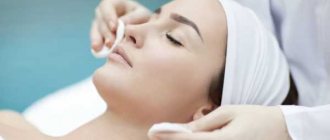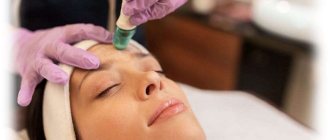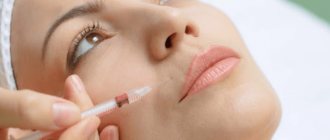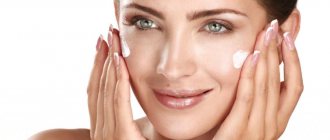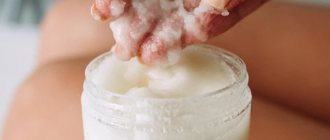What is biorevitalization
Biorevitalization is an injection procedure aimed at increasing the hydration and resourcefulness of the skin. For the procedure, preparations with a high content of hyaluronic acid (HA) are used. Since hyaluronic acid is a natural component found in our skin, HA coming from outside is absorbed organically by the tissues. Replenishing its deficiency increases hydration, improves the protective functions of the skin, and promotes rapid regeneration. Injections of hyaluronic acid prevent pigmentation and ensure healthy metabolism. The concept of “biorevitalization” stands for natural revitalization and revival of the skin.
HA injections are carried out in the face, neck, décolleté, hands, elbows, and intimate area.
Procedures need to be done in a course. Subsequently, biorevitalization is prescribed to maintain the result once every six months to a year. This will help the skin remain beautiful and youthful for a long time. Biorevitalization with hyaluronic acid can enhance the effect of laser procedures. With a comprehensive rejuvenating effect, the laser has a slight drawback - under its influence, moisture evaporates from the skin. To restore its balance, HA injections are prescribed: before or after a course of laser rejuvenation.
Advantages of the method
- speed and comfort of the procedure;
- only a few procedures are required to achieve long-lasting, noticeable results;
- rejuvenation occurs naturally - HA is a 100% natural component;
- the procedure can be done at any time of the year;
- biorevitalization solves a wide range of aesthetic problems;
- with its help you can easily get rid of rashes, dryness, peeling, redness and other discomfort associated with the skin;
- the procedure can be performed on men and women after 25 years;
- there are very few contraindications to injections;
- long lasting results that will always meet your expectations.
Execution Features
Needle-free biorevitalization techniques are becoming increasingly popular precisely because they are non-traumatic. But the drugs in this case are distributed evenly in the upper layers of the epidermis. Therefore, the effect of deep rejuvenation and correction of the oval of the face cannot be achieved in this way. Although for this type of procedure, menstruation is not a hindrance - they can only provoke slight swelling, which will quickly pass.
Injection biorevitalization gives much more impressive results. In this case, the hyaluronic acid is delivered exactly to the desired areas and in the required quantities. But such a procedure, although low-traumatic, still violates the integrity of the skin. This means it has more contraindications and various restrictions.
Is it possible to do biorevitalization before menstruation?
Before menstruation, women react more sensitively to the world around them - both psychologically and physiologically. The pain threshold also decreases. Moments that a woman would simply not pay attention to in the middle of her cycle seem painful. Accordingly, if you notice the appearance of pain before your period, you should not do biorevitalization on these days.
Some patients prefer to find out from their own experience. As an experiment, you can attend an injection procedure a couple of days before your period. If you tolerate the injections well, then in the future you will not limit yourself to the dates of injection rejuvenating procedures.
Conclusion
The decision whether it is possible to do biorevitalization during menstruation is up to you. The doctor can only warn about the side effects of the procedure and give recommendations. And if the client wants to take a risk, then he takes responsibility for the consequences. Although if you wait a little, the effect of visiting a beauty clinic will be much more noticeable and pleasant.
Ideal time for therapy
Professional rejuvenation will give maximum results if performed in the second half of the cycle, that is, immediately after ovulation. At this time, you will experience less physical and psychological discomfort during the procedure, recovery from tissue injury will be faster, and the risk of infection will be minimal.
And, of course, the success of microinjections will depend on the qualifications of the specialist you contact, as well as competent care after the procedure.
Consequences for the face
Since there are no direct contraindications to HA injections during menstruation, the procedure on menstruation will not entail any serious consequences. The only aesthetic drawbacks may be bruises at the injection sites. Due to the more liquid state of the blood, there is a greater chance that blood vessels will be damaged during the administration of the drug. Accordingly, the risk of small hematomas is higher than on other days of the cycle.
Bruises usually go away in 2-3 days. In some patients, this complication takes longer - a week or ten days. One way or another, there is nothing to be afraid of - the vessels will regenerate, the bruises will resolve, and you will look your best again.
The effect of biorevitalization
- narrowing of pores;
- even out color and skin texture;
- elimination of redness, peeling, imperfections;
- normalization of the activity of the sebaceous glands;
- increasing skin tone;
- smoothing out small wrinkles.
What happens in a woman's body during menstruation?
Menstruation is a special day in the life of every woman. A drop in hormone levels in the body is just one of the manifestations that await women during this period. The temporary changes do not end there; their series is quite long:
- sweat production increases;
- pulse accelerates;
- there is a slight increase in pressure and body temperature;
- the amount of hemoglobin decreases significantly;
- the level of platelets changes, which can affect swelling - it will last longer;
- pain receptors acquire special sensitivity;
- the sebaceous glands begin to work actively, and rashes may even appear;
- weakens the immune system.
You can learn more about what happens to a woman’s body during menstruation from the video:
Important! If you ask any cosmetologist whether it is possible to do biorevitalization during menstruation, or to abstain, the answer will be unequivocal - it is better not to tempt fate and not check how inadequately the body will react to the introduction of fillers.
After Botox
Many ladies are interested in whether it is possible to do biorevitalization after Botox. Manipulation is permitted. Moreover, as positive reviews indicate, these procedures complement each other perfectly. But they cannot be carried out on the same day, so as not to provoke severe swelling and not to negate the entire effect of the effects of hyaluronate. Cosmetologists recommend observing a pause between manipulations. After Dysport (Botox injections), biorevitalization is usually carried out 14 days later.
For rosacea
Unsightly spider veins on the face can be easily eliminated after a course of biorevitalization. The development of rosacea can be slowed down for a long time; it will be possible to get rid of red spots on the face for a period of several months to several years.
It is better to resort to restorative procedures at the initial signs of vascular problems, then the effect will be faster and more noticeable.
However, first you need to find out what caused the rosacea. If a person suffers from chronic diseases of the kidneys, thyroid gland (for example, hypothyroidism), liver, stomach, the procedure most likely will not help. Very soon the signs of rosacea will appear again. In such a situation, you need to understand and eliminate the cause of rosacea.
Possible problems
Often patients try to find out whether it is possible to do needle biorevitalization with injections during menstruation, in principle. In fact, this technique is quite acceptable - menstruation is not a categorical contraindication to the procedure. But in light of the factors listed above, doctors still advise abstaining from it, so as not to provoke problems.
Stress
Even for those who are not afraid of injections, they are always stressful, accompanied by the release of adrenaline and an increase in blood pressure. And during menstruation, hormonal levels are already disrupted, and other indicators are slightly elevated. That is, the body actually already lives in a state of stress and another additional one is completely inappropriate for it.
Moreover, the patient’s nervous state is always transmitted to the cosmetologist. And here the human factor can already come into play: the hand trembles, the needle goes deeper, an error creeps in in dosage calculations. All this is not so scary, but it can affect the final result. By the way, the likelihood that during menstruation the patient will remain dissatisfied with it also increases.
Soreness
To make injections better tolerated, cosmetologists use anesthetic gel applications. They reduce the sensitivity of nerve endings. But during menstruation it is aggravated. Therefore, the sensations are as if there was no anesthetic at all.
This is uncomfortable for the patient and prevents the doctor from doing his job properly. When the client lies quietly, it is almost impossible to make mistakes in the injection points and it is easy to control the depth of the punctures. If it is compressed and torn, then there is a risk of piercing the epidermis too deeply, damaging a nerve or large vessels.
Swelling
When hyaluronic acid is injected under the skin, slight swelling always occurs, even if there is no damage to it. This is due to the accumulation of a large volume of water attracted by hyaluronic acid molecules. Later it is more or less evenly distributed, and the swelling goes away.
During injections, swelling is the result of increased lymph secretion in response to punctures. Thus, the body strives to restore the integrity of the skin as quickly as possible and prevent infection from entering the blood. During menstruation, the lymph flow is already activated, which means that more fluid accumulates at the injection sites and it dissolves more slowly.
Bruises and hematomas
They are the result of needle damage to capillaries or small blood vessels located under the skin. When this happens, platelets quickly plug the hole and blood stops flowing. The bruises are small and disappear within 4-5 days.
With high blood pressure and decreased coagulability due to the low content of platelets in it, much more blood will flow out of the same puncture. The bruises will be extensive, and if even a small vessel is damaged, a hematoma can form. Accordingly, biorevitalization during menstruation increases this complication.
Infection
Even with complete sterility, a small number of pathogenic microorganisms penetrate into any wound. But the immune system, which stands on guard, prevents them from multiplying and provoking the development of a skin disease or a strong inflammatory process.
It’s only during menstruation that she turns out to be weakened. Therefore, many patients notice that redness on the wounds remains for up to a week, and skin inflammation and suppuration often develop. This can be prevented by careful care using anti-inflammatory ointments and antiseptics. But is it worth the risk?
No result
Also, many doctors believe that biorevitalization and menstruation are incompatible due to the unpredictability of the result. When a patient comes for a procedure that costs several thousand rubles, she wants to be sure that her face will be refreshed after it and the effect will last for at least several months.
If it is performed in the first days of the menstrual cycle, when hormonal levels are extremely unstable, no one can give such a guarantee.
Some people show no results at all. For others it lasts only a few weeks. Still others experience an allergic reaction, although there was none before. So the negative consequences at this time can be very different, although not too dangerous.
After antibiotics
It is undesirable to combine antibacterial therapy and a course of anti-aging injection procedures. In this case, the expected cosmetic effect may be reduced to zero.
Medication is prescribed for a history of an inflammatory infectious process, which is accompanied by a weakened immune system. All this is incompatible with biorevitalization. There is a possibility of allergic reactions appearing or intensifying; the body may reject injected drugs based on hyaluronic acid. After taking antibiotics, you should allow the body to recover (about two weeks) before resorting to the specified cosmetic procedure.
For autoimmune diseases, including diabetes mellitus
Hyaluronic acid often contains a minimal amount of protein from the microorganisms used to obtain the drug. A foreign protein introduced into the skin is positioned by the immune system as an antigen, and it begins to produce antibodies to fight it. At the same time, sometimes there is a similarity between a foreign protein and one’s own, which is part of human tissue. As a result, an autoimmune disease develops, which can make the patient disabled. Poorly purified anti-aging drug and problems with the immune system (for example, rheumatoid arthritis, diabetes) are the main reasons for these consequences.
Contraindications to the procedure
Like any other cosmetic procedure, biorevitalization has contraindications. These include:
- inflammatory processes on the skin;
- You cannot do biorevitalization during pregnancy and breastfeeding;
- the presence of herpetic infections in the body in acute form;
- autoimmune diseases;
- individual intolerance to drugs administered orally;
- severe diseases in a chronic form.
There can be complications from injections even if you are taking medications that are aimed at thinning the blood.

